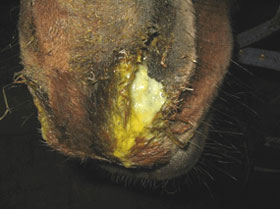
Strangles on the increase in the UK
The British Horse Society and the Animal Health Trust today (Wednesday, 7 February) staged the launch of a campaign to raise £250,000 to eradicate Strangles – a horrible disease attacking and killing horses.
The launch at the Royal (Dick) School of Veterinary Studies – presented by Olympic medallist Ian Stark OBE FBHS, AHT senior scientist Andrew Waller, BHS Scotland Development Officer Helene Mauchlen and BHS Communications Director Oliver Wilson – was one of eight taking place across Scotland, Wales, Ireland and England over the period of a week.
HRH The Princess Royal spoke at the London launch last Thursday (1 February). BHS Scotland (BHSS) has been lobbying hard in Scotland Parliament for new measures to help to slow the spread of Strangles in Scotland.
HRH The Princess Royal spoke movingly of her personal experience of the equine plague Strangles – an outbreak at her stables at her Gatcombe home.
The Princess Royal said: “I am very pleased the Animal Health Trust and The British Horse Society are working together on this campaign. It could make a real difference to the welfare of horses.
Two of my horses suffered permanent damage. I learnt the hard way – I still don't know where my Strangles came from.”
BHS Scotland Development Officer Helene Mauchlen said: “Horse owners and vets throughout Scotland are constantly on the alert for Strangles – a contagious upper-respiratory condition that is currently reaching concerning levels of infection in stables and yards.
“During 2006, more than 10 percent of the BHS approved establishments in the UK were struck by Strangles. This unprecedented rise in the incidence of the disease has sparked calls for renewed research into a fully effective vaccine and spurred vets and welfare organisations to develop a five-pronged strategy to tackle the disease.”
She added: “The efforts of the UK Strangles Strategy Group are concentrating on the seeking of funding to improve the diagnosis of shedders (carrier status equines with masked symptoms), improving surveillance to properly gauge the prevalence of the disease in the UK, ongoing discussion of reportable status, improving educational resources and a high profile Strangles Awareness Week.”
Kay Driver, Chief Executive of the Scottish SPCA and founder member of the Strangles Strategy Group said:
“We strongly welcome the UK-wide approach to tackle this disease. The Strategy Group will continue to work hard to raise awareness of Strangles in the UK and to press for further resources for dealing with the disease.”
BHS Chief Executive Graham Cory said: “We have a golden opportunity to stamp out this terrible disease. If the money needed for research can be raised, we are confident we can tackle this problem effectively and stem the spread of Strangles.”
AHT Chief Executive Peter Webbon said: “Strangles must be beaten. We believe a solution can be found through our research programme. We urge everyone to help us and the BHS to end the suffering of horses and ponies caused by Strangles.”
Strangles – triggered by the bacterium Streptococcus equi. – is one of the world's most common respiratory diseases, hitting horses of all types and ages.
It spreads like wildfire in stables, striking down horses at a devastating rate. Strangles kills up to 10 percent of the horses it attacks. Many others survive but become carriers of the disease without any exterior symptoms and go on to infect other horses.
Strangles is an economic disaster for affected yards, which often have to shut down for months. Getting rid of Strangles depends on research to improve methods of prevention and diagnosis.
NOTES TO EDITORS:
When a horse contracts the disease, it initially loses its energy and appetite. Swelling and abscesses occur around the throat. The horse then finds it hard to breathe and swallow – as if it is being strangled (hence the name Strangles).
When the abscesses rupture, in some cases other horses can be infected. If the abscesses spread to other parts of the horse's body, the condition is usually fatal.
